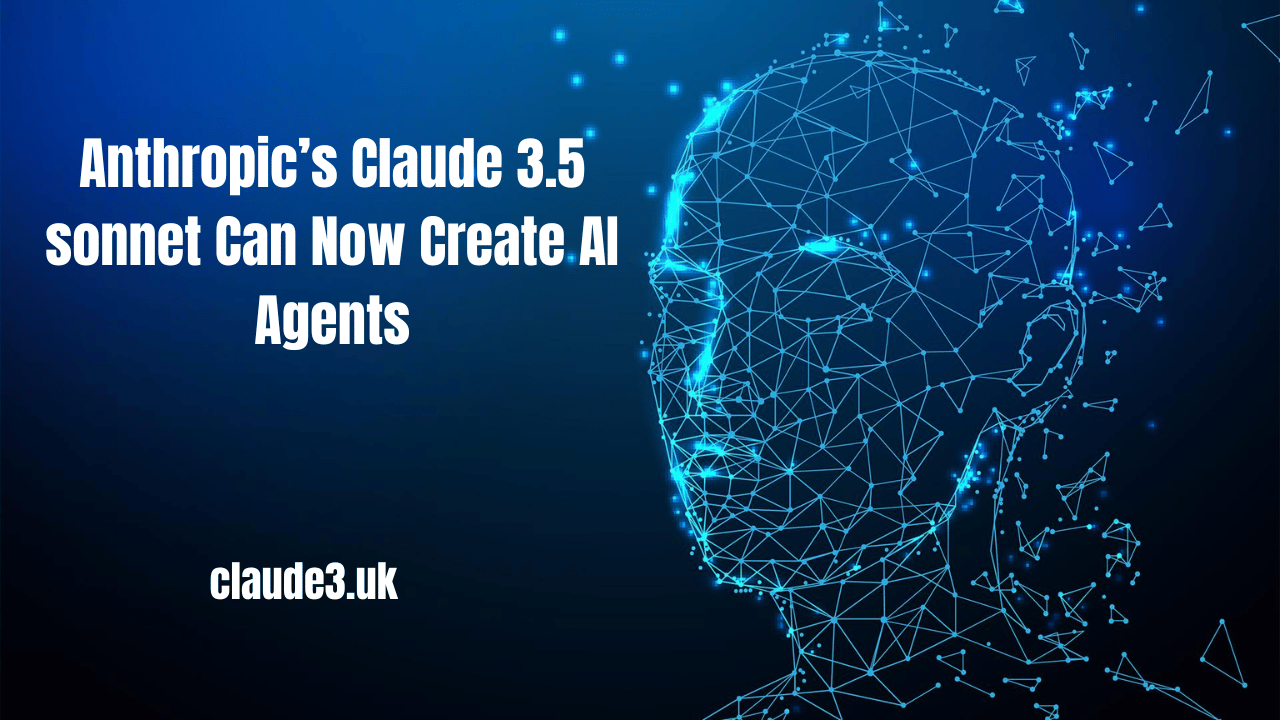Anthropic, a leader in artificial intelligence (AI) research and development, has unveiled a groundbreaking update to its Claude 3.5 Sonnet platform.
This update allows the AI system not only to generate sophisticated poetry but also to create AI agents—virtual entities capable of autonomous decision-making and interaction.
This article explores the implications, features, technology behind Anthropic’s Claude 3.5 Sonnet AI agents, their applications across various industries, ethical considerations, and the future landscape of AI-driven agents.
1. Introduction to Anthropic’s Claude 3.5 Sonnet AI Agents
Evolution of Claude 3.5 Sonnet
Anthropic’s Claude 3.5 Sonnet has evolved from a poetry generation tool to a versatile platform capable of creating AI agents. Named after Claude, a symbolic figure in poetic history, and marked as version 3.5, this AI demonstrates Anthropic’s commitment to advancing AI capabilities in creative and practical domains.
Integration of AI Agent Technology
The integration of AI agent technology into Claude 3.5 Sonnet marks a significant expansion of its functionalities. By leveraging its robust AI architecture, Anthropic has enabled Claude 3.5 Sonnet to simulate human-like decision-making processes and interact autonomously within defined environments.
2. Technology Behind Claude 3.5 Sonnet AI Agents
AI Model Architecture
Claude 3.5 Sonnet AI agents are built upon advanced transformer architectures, similar to those used in leading natural language processing (NLP) models. These architectures enable the agents to understand complex language patterns, learn from interactions, and make informed decisions based on contextual understanding.
Training and Data Sources
The AI agents are trained on vast datasets that include not only poetry and literary works but also real-world data relevant to their intended applications. This comprehensive training ensures that the agents can perform tasks, engage in dialogue, and adapt to various scenarios effectively.
Natural Language Understanding
Claude 3.5 Sonnet AI agents excel in natural language understanding, allowing them to comprehend user queries, engage in meaningful conversations, and generate responses that are contextually appropriate. This capability enhances their utility across diverse domains, from customer service to virtual companionship.
3. Features of Claude 3.5 Sonnet AI Agents
Autonomous Decision-Making
One of the core features of Claude 3.5 Sonnet agents is their ability to make autonomous decisions based on input data and predefined objectives. This capability allows them to perform tasks independently, such as answering queries, providing recommendations, or executing commands in virtual environments.
Interaction and Engagement
The AI agents are designed to engage users in interactive dialogue, providing information, offering assistance, and maintaining coherent conversations over extended periods. Their ability to understand context and respond appropriately enhances user experience and satisfaction.
Customization and Personalization
Users can customize Claude 3.5 Sonnet AI agents to suit specific preferences and requirements. This includes adjusting their personality traits, language style, and interaction modes to align with user expectations and enhance engagement.
Multi-Modal Capabilities
Claude 3.5 Sonnet AI incorporate multi-modal capabilities, enabling them to process and respond to text, voice, and visual inputs. This versatility allows for seamless interaction across different communication channels and enhances accessibility for users.
4. Applications of Claude 3.5 Sonnet AI Agents
Customer Service and Support
In the realm of customer service, Claude 3.5 Sonnet AI agents can act as virtual assistants, handling customer inquiries, providing product information, and resolving issues in real time. Their ability to understand natural language and maintain consistent communication enhances service efficiency and customer satisfaction.
Virtual Companionship and Entertainment
Claude 3.5 Sonnet AI agents can serve as virtual companions, offering personalized interactions, entertainment, and companionship. They can engage users in meaningful dialogue, recommend content based on preferences, and adapt their responses to foster a dynamic and engaging user experience.
Educational Tools and Learning Assistants
In educational settings, Claude 3.5 Sonnet agents function as learning assistants, providing personalized tutoring, explanations of complex concepts, and interactive learning experiences. They can adapt teaching methodologies to suit individual learning styles and support students in achieving academic goals.
Healthcare and Well-being Applications
Claude 3.5 Sonnet AI agents have potential applications in healthcare, supporting patient care, mental health monitoring, and well-being initiatives. They can provide information on health-related topics, offer emotional support through interactive dialogue, and encourage healthy behaviors.
5. Ethical Considerations
Privacy and Data Security
The deployment of Claude 3.5 Sonnet agents raises concerns about privacy and data security. Measures must be implemented to safeguard user data, ensure consent for data usage, and mitigate risks associated with unauthorized access or misuse of personal information.
Transparency and Accountability
There is a need for transparency regarding the capabilities and limitations of Claude 3.5 Sonnet AI agents. Users should be informed about the AI’s decision-making processes, sources of information, and potential biases to promote trust and accountability in their interactions.
Fairness and Bias Mitigation
Efforts must be made to mitigate biases in Claude 3.5 Sonnet AI agents, particularly in their language understanding and decision-making algorithms. Fairness considerations should address issues related to diversity, inclusivity, and equitable treatment across user demographics.

6. Future Developments and Innovations
Enhanced Cognitive Abilities
Future developments for Claude 3.5 Sonnet AI agents may focus on enhancing their cognitive abilities, including advanced reasoning, emotional intelligence, and adaptive learning capabilities. These enhancements could broaden their applications in complex decision-making domains.
Integration with IoT and Smart Devices
Integration with Internet of Things (IoT) devices and smart environments could enable Claude 3.5 Sonnet AI agents to interact seamlessly with physical surroundings, perform automated tasks, and provide personalized assistance based on environmental cues.
Cross-Domain Applications
Claude 3.5 Sonnet AI agents may expand into new domains, such as legal services, financial advice, and creative industries, where their cognitive abilities and interactive capabilities can add significant value and innovation.
7. Conclusion
Impact and Implications
Anthropic’s Claude 3.5 Sonnet AI agents represent a leap forward in AI technology, blending creative expression with practical utility in the form of autonomous virtual agents. Their integration into various industries promises enhanced efficiency, personalized experiences, and new opportunities for innovation.
Ethical and Societal Considerations
As Claude 3.5 Sonnet AI agents continue to evolve, addressing ethical considerations—such as privacy, fairness, and transparency—will be crucial. By navigating these challenges thoughtfully, stakeholders can maximize the benefits of AI-driven agents while mitigating potential risks.
Future Prospects
Looking ahead, the future of Claude 3.5 Sonnet AI agents is bright, with potential advancements in cognitive capabilities, cross-domain applications, and user engagement. As technology progresses, these agents are poised to play a transformative role in shaping the future of interactive AI and virtual companionship.
FAQs
What are AI agents in Claude 3.5 Sonnet?
AI agents in Claude 3.5 Sonnet are virtual entities that can perform tasks, engage in conversations, and make decisions autonomously. They are designed to interact with users in a human-like manner.
How do Claude 3.5 Sonnet AI agents work?
These AI agents use advanced natural language processing (NLP) and machine learning algorithms to understand user input, process information, and generate appropriate responses. They are trained on extensive datasets to handle various tasks and scenarios.
What are the key features of Claude 3.5 Sonnet AI agents?
Key features include autonomous decision-making, interactive and engaging dialogue, customization options, and multi-modal capabilities (text, voice, visual inputs).
What are some applications of Claude 3.5 Sonnet AI agents?
Applications include customer service, virtual companionship, educational tools, healthcare support, and entertainment. They can assist in answering queries, providing recommendations, offering personalized interactions, and more.
Are there ethical considerations for using Claude 3.5 Sonnet AI agents?
Yes, ethical considerations include ensuring transparency, mitigating biases, and maintaining fairness in AI interactions. These measures are essential to build trust and promote ethical AI usage.
